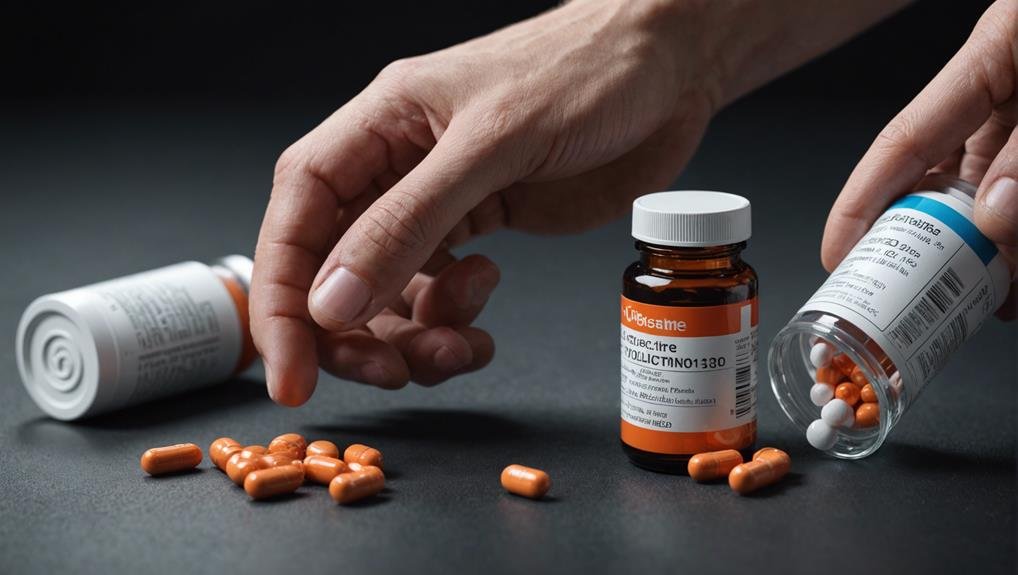FDA Study Finds Expired Drugs Remain Effective
In the domain of expired drugs, the FDA study exposes a surprising revelation: more than 90% of tested medications retain their safety and effectiveness beyond their expiration dates. This study challenges conventional beliefs about expired drugs and their potency, offering a new perspective on medication use. Proper storage conditions, including temperature and humidity, play a crucial role in maintaining drug effectiveness post-expiration. By understanding these factors, one can make informed decisions regarding the use of expired medications. The FDA's research on drug expiration sheds light on managing medications beyond their labeled dates, providing insights that could reshape medication practices.
Key Takeaways
- Over 90% of tested drugs retained effectiveness post-expiration.
- Proper storage conditions impact drug potency post-expiration.
- Consult healthcare providers for guidance on using expired medications.
- FDA study challenges common beliefs on expired drug effectiveness.
- Understanding expiration dates can reduce medication waste and enhance access.
Study Results & Findings
In a groundbreaking FDA study on expired medicine and safety, it was discovered that more than 90% of over 100 tested drugs remained safe and effective even years after their expiration dates. These FDA findings suggest that medication longevity might extend well beyond the labeled expiration date.
While some drugs may lose potency over time, they're unlikely to be harmful. The study highlights the importance of understanding that expired medications can often retain their effectiveness, offering a potential cost-saving and waste-reducing option for consumers.
It's essential to consult healthcare providers for guidance on using expired medications, especially for liquid forms that may degrade faster than solid forms. The FDA's findings provide valuable insights into managing medication use beyond expiration dates.
Safety of Expired Medications
How can the potency and safety of expired medications be reliably assessed for consumption?
According to FDA guidelines, it's important to understand that expiration dates on medications indicate the manufacturer's guarantee of full potency and safety until that time. While some drugs may lose effectiveness post-expiration, most are likely still safe to use. The FDA study found that 90% of tested drugs remained effective even years past their expiration dates.
However, it's essential to exercise caution and consult healthcare providers when in doubt. Proper medication disposal methods, such as utilizing drug take-back programs or following FDA recommendations for at-home disposal, should be employed to guarantee the safety of expired medications and prevent potential harm.
Impact on Drug Potency
Evaluating drug potency post-expiration involves understanding the manufacturer's guarantee and the FDA study's findings on medication effectiveness. Storage conditions play a vital role in determining drug potency after the expiration date. Factors such as exposure to light, moisture, and temperature fluctuations can impact the shelf life of medications. It's important to store drugs in a cool, dry place away from direct sunlight to maintain their potency.
While some drugs may lose potency over time, the FDA study revealed that many medications remain effective even years after their expiration dates. Understanding the relationship between storage conditions and shelf life can help you make informed decisions about the potency of expired drugs.
FDA's Research on Drug Expiration
FDA's study on drug expiration highlights the long-term safety and effectiveness of medications well beyond their listed expiry dates. Proper drug storage plays an essential role in maintaining drug potency. Factors such as temperature, humidity, and light exposure can impact shelf life. Ensuring medications are stored in a cool, dry place away from direct sunlight can help prolong their effectiveness. The shelf life of drugs can vary based on their formulation, with liquid medications typically having a shorter shelf life compared to solid forms. By understanding the importance of drug storage and shelf life, individuals can make informed decisions regarding the use of expired medications.
| Drug Storage | Shelf Life | Impact on Effectiveness |
|---|---|---|
| Temperature | Varies | Can prolong effectiveness |
| Humidity | Formulation-dependent | Proper storage is key |
| Light Exposure | Liquid vs. Solid | Consider formulation |
Implications for Public Health
The extended safety and efficacy of expired medications, as revealed by the FDA study on drug expiration, have significant implications for public health awareness and medication management.
Public awareness regarding the potential effectiveness of expired drugs challenges common beliefs and may lead to reduced medication waste.
Healthcare implications suggest that revisiting expiration dates could provide cost-effective options for individuals and healthcare systems.
Improved understanding of drug expiration could enhance medication access, especially in resource-limited settings.
Proper education on drug expiration could empower individuals to make informed decisions about medication usage, potentially reducing unnecessary disposal and promoting sustainable healthcare practices.
Conclusion
You may be surprised to learn that according to the FDA study, 90% of both solid and liquid medications can retain their potency even years past their expiration date.
This eye-opening research highlights the importance of understanding the safety of expired drugs and their effectiveness.
By being informed about the findings, you can make better decisions about managing your medication regimen and potentially save money by using expired medications that are still safe and effective.







